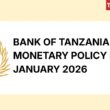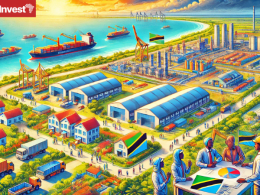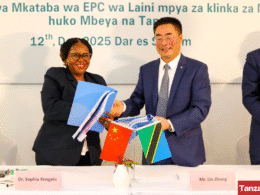TanzaniaInvest had the pleasure of interviewing Dr. Adelhelm Meru, Permanent Secretary of the Tanzania Ministry of Industry, Trade and Investments.
Dr. Meru explains the current government’s focus on industrialization, its key subsectors, and the opportunities available to investors.
TanzaniaInvest (TI): Dr. Meru, the current development of Tanzania is based on a very clear vision spelled out in three documents: Vision2025, the current 5-year development plan, and the recently-approved 2016/17 budget, whose title is “Industrial Growth for Job Creation.” Why is there such a big emphasis on industrial development?
Adelhelm Meru (AM): It is indisputably clear that many countries that have developed strong economic bases, have done so through emphasizing on industrialization.
That being the case, Tanzania cannot be an exception. Industries create jobs, generate revenue, stimulate introduction of new technologies and motivates trade in industrial products.
For many years Tanzania had been a victim of exporting raw materials thereby losing money, jobs, technology and foreign currency.
We have now decided to proudly say “enough is enough”!
Tanzania has many forms of raw materials which could be added value thereby promoting industrialization, such as a variety of agricultural products, a variety of minerals resources, forests, livestock.
It is through this background that our 2nd Five years Development Plan 2016/17 – 2020/21 gives strong emphasis on industrialization.
The aim of the Government is to ensure full utilization of the available natural resources by benefiting from the long value chains and ultimately fast-tracking our socio-economic development.
The Government’s industrialization target is to raise the contribution of the industry sector to the GDP from the current 7.4% to 15% by the year 2020.
Further, the Tanzania National Development vision 2025 has as one of its core objectives to transform Tanzania from a low agricultural economy to a semi-industrialized nation by 2025.
It is our Ministry that has the noble task of ensuring fully implementation of these targets and we are doing all what we can to make no mistake.
TI: Which sectors of the Tanzanian economy present the greatest opportunities for value addition?
AM: According to our industrialization strategy, sectors for value addition are several; however, the predominant sector is agriculture.
Agriculture has an advantage of having long value chains thereby creating many jobs.
In the agriculture sector, value addition opportunities are available in the processing of agro products such as cotton to clothing, cashew nuts, edible oil, fruits and vegetables, rubber, sugar, wood products just to mention a few.
Value addition opportunities are as well in the livestock sub sector.
Tanzania is a second livestock keeper in Africa, next to Ethiopia with 21.5m cattle, 15.4m goats and 5.9m sheep.
The availability of this large stock of livestock provides value addition opportunities in meat processing, dairy processing as well as leather processing.
Another sub sector that is potential for value addition is fishing. Tanzania is well endowed with the blue economy as 6% of the country is covered by fresh and sea water in which fish catching is predominant.
This provides a clear investment opportunity in fish processing. Forestry is another sector which has a high potential for value addition.
Opportunities are in the production of wood chips, wood pulps and furniture.
The next potential sector is mining. Tanzania is a mineral rich country; available minerals include metals, non-metals and natural gas.
Value addition opportunities exist in mineral processing including steel production, cement production, game stone cutting and polishing, jewellery and processing gas products.
TI: What will be the destination of the goods manufactured in Tanzania?
AM: The markets for Tanzanian manufactured goods are several. Most importantly is the local market.
Tanzania has a population of about 50m people, which ensures a good market for the manufactured goods.
Also, Tanzania is a member of the East African Community (EAC) and the South African Development Community (SADC) in which goods are sold without duties.
EAC includes 6 countries and has a population of about 120m people, whereas SADC includes 15 countries and has a population of over 300m people.
Tanzania has as well bilateral trade arrangements with various countries and blocks in which several items can be sold duty free and quota free.
Such counties and blocks include the USA through the African Growth and Opportunity Act (AGOA); the European Union through the Everything But Arms (EBA) initiative; China; Japan; Canada; India and Turkey.
With such diversified markets, whoever opts to set up a factory in Tanzania for production of industrial goods will never regret.
TI: Tanzania has decided not to sign the long negotiated Economic Partnership Agreements (EPA) with the EU. What is the rationale behind this decision?
AM: It is true that Tanzania did not sign the Economic Partnership Agreement with the EU which was scheduled for signing in July this year.
The rationale behind the decision was just the timing. The Government was still new in office by then; it subsequently needed a little more time to consult and formulate the country opinion.
TI: What are the challenges you are faced with in developing the industrialization of Tanzania?
AM: There are a number of challenges that undermine our industrialization plans.
However, the government is doing all that it can to mitigate them in good time.
The biggest challenge is the limitation in serviced land for setting up factories.
A few existing industrial parks that were fully developed are now full, thereby making it difficult to secure fully serviced industrial plots to investors.
In order to address this challenge, the Government is now seriously implementing the Special Economic Zones (SEZ) concept by setting aside land for industrial development.
Land for SEZs and Industrial parks has so far been set aside in Bagamoyo, Kigoma, Songea, Tanga, Mtwara, Mwanza, Mara, Dodoma ad Singida.
Plans to develop basic on site infrastructure in these Zones are underway.
The next challenge is infrastructure (roads, railways, ports, power, water, gas and telecommunications).
Again, the Government is already addressing several hard and soft infrastructure challenges.
For example, power generation has been substantially increased and gas and water availability have, as well, been significantly improved.
Construction of a standard gauge railway line is already underway and road networks are being improved in various parts of the country.
The other two challenges are availability of new technologies and skills labor force.
The issue of technology is being addressed by empowering our R&D Centres namely TIRDO, TEMDO, CARMATEC and COSTECH, whereas on skills labour, special attention is being put on institutions that are providing technical skills namely the University of Dar es salaam, the Dar es salaam Institute of Technology (DIT), the Vocational Education and Training Authority (VETA) and Small Industrial Development Organisation (SIDO).
TI: How are you financing the required infrastructure development for the industrialization of Tanzania? What are the investment opportunities available?
AM: Infrastructure development is being financed through 3 models. The first model is for the government to finance infrastructure projects through its own budget or loans.
A good example is the gas pipeline project from Mtwara to Dar es Salaam, Kinyerezi power projects and a standard gauge railway line.
The second model is through Public Private Partnerships (PPPs). With the establishment of the PPP Act, a good number of PPP projects are already in place.
Examples of such projects are the Mchuchuma and Ngaka power projects and the Bagamoyo SEZ project.
The third model is private sector financed projects. Such projects include the Kamal Industrial park, Kisongo Industrial park, and Global industrial park.
The investment opportunities available in infrastructure development include development of Industrial parks, construction of industrial sheds and warehouses, provision of utility services (water, power, gas and telecommunication systems) in industrial parks and Special Economic Zones, as well as joining hands with the Government in undertaking PPP projects in construction of roads, ports and power projects.
TI: What role the private sector is expected to play in the industrialization of Tanzania?
AM: The private sector has the biggest role in the industrialization process.
The role of the government is just to create an enabling environment through policy development, regulation, development of basic infrastructure and provision of facilitation services.
However, the major role in the industrialization process, which includes investing in manufacturing or processing operations, construction of industrial parks as well as providing industrial related consultancy services, lies entirely in the hands of the private sector.
The Government understands the challenge of access to finance which the private sector is facing.
In addressing this challenge, the Government is planning to establish an Industrial Development Bank that will specifically finance industrialists and SME operators who would like to invest in industrial related projects.
TI: To conclude, what makes Tanzania a preferred spot for investing in industries?
AM: Tanzania has several competitive advantages which makes it an ideal spot for industrial related investments.
First and foremost is the availability of a variety of raw materials for production which guarantees continuous production operations.
Second is the market opportunities starting with the local market, the regional markets and other international markets where investors can export their industrial products duty free and quota free.
Third is the competitive legal framework with good investment policies and attractive incentives.
Fourth is the best facilitation services offered by our investment promotion agencies namely TIC and EPZA through their One Stop Service Centres.
And fifth is the peace and political stability which Tanzania has been enjoying since its independence in 1961.
With all these (and many more) comparative advantages at hand, Tanzania is certainly a preferred spot for investing in industries.











